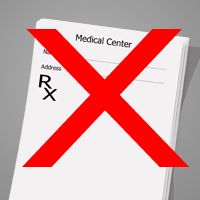Article
NY Docs Press for E-Script Delay
Author(s):
Handwritten prescriptions will soon be illegal in New York. The Medical Society of the State of New York (MSSNY) and 18 national and NY State medical organizations are trying to delay for a year the onset of a law that would require electonic prescriptions, ban prescription pads, and drastically restrict phoned-in prescriptions. The measure, due to take effect March 27, would require electronic prescriptions for all medications-not just for controlled substances but antibiotics, allergy medications or anything else that requires a prescription.

Handwritten prescriptions will soon be illegal in New York. The Medical Society of the State of New York (MSSNY) and 18 national and NY State medical organizations are trying to delay for a year the onset of a law that would eliminate handwritten prescriptions and drastically restrict prescribers from phoning them in.
The measure, due to take effect March 27, would require electronic prescriptions for all medications—not just for controlled substances but antibiotics, allergy medications or anything else that requires a prescription.
Believed to be the first in the nation, the law expands on the state’s successful Internet System for Tracking Over-Prescribing Act, (I-STOP) law, one that requires physicians and pharmacists to check a patient’s prescription history before writing an order for a controlled substance.
“We support the law, but we are looking for a delay,” said Elizabeth Dears, JD, the medical society’s senior vice president for legal and legislative affairs.
The law is meant to stop the diversion of prescriptions drugs to black-market resale, reduce errors due to illegible handwriting, and end fraud resulting from the theft of prescribers’ prescription pads.
“Sending prescriptions by computer would do away with all that,” Dears said.
But there are many hurdles.
Much of the software needed to make the system work has yet to be certified as EHR compliant. Some physicians who write fewer than 25 or so prescriptions annually are balking at having to make the $350 to $1,000 annual commitment to be able prescribe electronically.
In a Jan. 8 letter to NY State Acting Commissioner of Health Howard Zucker, MSSNY and the co-signing organizations said the new prescribing process would drastically disrupt prescribing practices at nursing homes and assisted living facilities, where nurses typically get phoned-in orders from offsite physicians then phone them in to a pharmacy.
"Without compatible software linked with an EHR the nursing home may not be aware of the communication between prescriber and pharmacy leading to possible delays in treatment and transcription errors,” MSSNY wrote.
There are consumer issues that need to be addressed as well, said Dears.
“Without a written prescription it will be harder for a consumer to comparison shop,” because the prescriber will transmit the prescription to a single pharmacy. Also, she said, it will mean that the prescriber will have to be specifically notified if a prescription needs to be sent to a 24/7 pharmacy instead of the patient’s usual drug store.
Physicians or other prescribers who needed to prescribe a drug but were at home, or otherwise not able to access the proper computer could call it in—but they would later have to make a computer entry explaining why that happened, she said.
“The law has a lot of burdensome qualities,” Dears said.
The organizations joining MSSNY in protesting the law include the American Congress of Obstetricians and Gynecologists, District II of the American Academy of Pediatrics, the state’s chapters of the American College of Physicians and many other specialty societies. The state’s Nurse Practitioner Association and Society of Physician Assistants have joined the protest.


